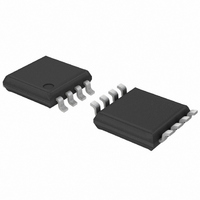PCA9550DP,118 NXP Semiconductors, PCA9550DP,118 Datasheet - Page 8

PCA9550DP,118
Manufacturer Part Number
PCA9550DP,118
Description
IC LED DRIVER BLINKER 8-TSSOP
Manufacturer
NXP Semiconductors
Type
LED Blinkerr
Datasheet
1.PCA9550DP118.pdf
(26 pages)
Specifications of PCA9550DP,118
Package / Case
8-TSSOP
Topology
Open Drain, PWM
Number Of Outputs
2
Internal Driver
Yes
Type - Primary
LED Blinker
Frequency
400kHz
Voltage - Supply
2.3 V ~ 5.5 V
Mounting Type
Surface Mount
Operating Temperature
-40°C ~ 85°C
Current - Output / Channel
25mA
Internal Switch(s)
Yes
Low Level Output Current
6.5 mA
Operating Supply Voltage
2.3 V to 5.5 V
Maximum Supply Current
500 uA
Maximum Power Dissipation
400 mW
Maximum Operating Temperature
+ 85 C
Mounting Style
SMD/SMT
Minimum Operating Temperature
- 40 C
Operating Supply Voltage (typ)
2.5/3.3/5V
Number Of Segments
2
Operating Temperature (min)
-40C
Operating Temperature (max)
85C
Operating Temperature Classification
Industrial
Package Type
TSSOP
Pin Count
8
Mounting
Surface Mount
Power Dissipation
400mW
Operating Supply Voltage (min)
2.3V
Operating Supply Voltage (max)
5.5V
Lead Free Status / RoHS Status
Lead free / RoHS Compliant
For Use With
OM6285 - EVAL BOARD I2C-2002-1A568-4002 - DEMO BOARD I2C
Voltage - Output
-
Efficiency
-
Lead Free Status / Rohs Status
Lead free / RoHS Compliant
Other names
568-3387-2
935272881118
PCA9550DP-T
935272881118
PCA9550DP-T
NXP Semiconductors
7. Characteristics of the I
PCA9550_5
Product data sheet
7.1.1 START and STOP conditions
7.1 Bit transfer
7.2 System configuration
The I
lines are a serial data line (SDA) and a serial clock line (SCL). Both lines must be
connected to a positive supply via a pull-up resistor when connected to the output stages
of a device. Data transfer may be initiated only when the bus is not busy.
One data bit is transferred during each clock pulse. The data on the SDA line must remain
stable during the HIGH period of the clock pulse as changes in the data line at this time
will be interpreted as control signals (see
Both data and clock lines remain HIGH when the bus is not busy. A HIGH-to-LOW
transition of the data line while the clock is HIGH is defined as the START condition (S).
A LOW-to-HIGH transition of the data line while the clock is HIGH is defined as the STOP
condition (P) (see
A device generating a message is a ‘transmitter’; a device receiving is the ‘receiver’. The
device that controls the message is the ‘master’ and the devices which are controlled by
the master are the ‘slaves’ (see
Fig 7.
Fig 8.
2
C-bus is for 2-way, 2-line communication between different ICs or modules. The two
SDA
SCL
Bit transfer
Definition of START and STOP conditions
START condition
2
SDA
SCL
Figure
C-bus
S
Rev. 05 — 13 October 2008
8).
2-bit I
Figure
data valid
data line
stable;
2
C-bus LED driver with programmable blink rates
9).
Figure
allowed
change
of data
7).
STOP condition
mba607
P
PCA9550
© NXP B.V. 2008. All rights reserved.
mba608
SDA
SCL
8 of 26















